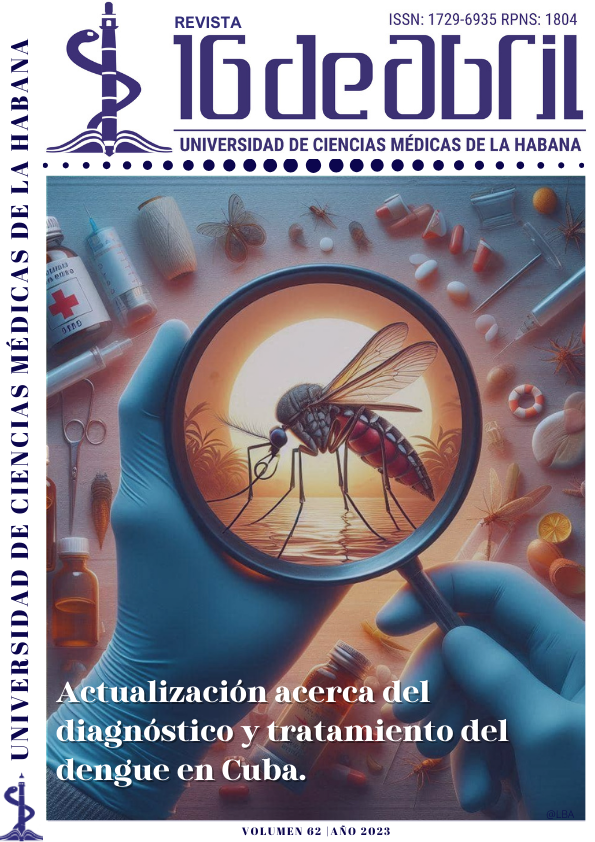Anthropometric indices for the estimation of obesity in young university students
Keywords:
Body Mass Index, Waist Circumference, Obesity.Abstract
Introduction: obesity is one of the factors with the highest incidence of vascular risk. Early detection by means of inexpensive, easily accessible and manageable tools is relevant for its prevention and control. Objective: to analyze anthropometric indicators to estimate body fat distribution and obesity in young university students. Method: observational, descriptive, cross-sectional study, from October 2015 to January 2018. Body mass index, waist/height ratio, taper index and body adiposity index were calculated. Results: overweight (n = 23; 10,7 %) and obese (n = 9; 4,2 %) students were identified. In relation to waist circumference, 16,3 % (n = 35) of the students were found to be at risk, with a predominance in females in relation to males. An elevated waist/height ratio was identified in 19,5 % (n = 42) of the young people. It was observed that 10,1 % (n = 16) of normal-weight young people (n = 158) were at risk according to waist circumference, body adiposity index (n = 31; 19,6 %) and taper index (n = 14; 8,9 %). Conclusions: most of the students presented low vascular risk, according to anthropometric indicators. However, the identification of overweight and obese students should be done not only with the body mass index, but should be complemented with at least one of the indicators that allow us to study the distribution of body fat.
References
2. Górnicka M, Szewczyk K, Białkowska A, Jancichova K, Habanova M, Górnicki K, et al. Anthropometric indices as predictive screening tools for obesity in adults; The need to define sex-specific cut-off points for anthropometric indices. Appl Sci [Internet]. 2022 [citado 02/11/2022]; 12(12):6165. DOI: 10.3390/app12126165
3. Alemañy Díaz-Perera C. Señales ateroscleróticas tempranas en adolescentes entre 10 y 19 años aparentemente sanos. Rev Cub Med Gen Integ [Internet]. 2020 [citado 01/09/2021]; 36(2):e1148 Disponible en: https://revmgi.sld.cu/index.php/mgi/article/view/1148
4. Pozo Pozo D, del Toro Cámbara A, Cuba Pasos Y, Monzón Tamargo MJ, Pita Valdés AC, Díaz Calzada M. Estado nutricional y variables antropométricas en adolescentes del Policlínico Universitario “Luis Augusto Turcios Lima”. Rev Cienc Méd Pinar del Río [Internet]. 2021 [citado 02/10/2022]; 25(4):e5091. Disponible en: http://revcmpinar.sld.cu/index.php/publicaciones/article/view/5091
5. Molano Tobar NJ, Chalapud Narváez LM, Villaquirán Hurtado AF. Estimación de obesidad desde índices de adiposidad en universitarios de Popayán, Colombia. Cultura, Ciencia y Deporte[Internet]. 2021[citado 01/09/2021];16(48):301-9. DOI: 10.12800/ccd.v16i48.1753
6. Zaragoza García O, Gutiérrez Pérez IO, Delgado Floody P, Parra Rojas I, Jerez Mayorga D, Campos Jara C, et al. Emergent anthropometric indices in differential prediction of prehypertension and hypertension in mexican population: Results according to age and sex. Int J Hypertension [Internet]. 2022 [citado 12/11/2022]; 2022:4522493. DOI: 10.1155/2022/4522493
7. Shukohifar M, Mozafari Z, Rahmanian M, Mirzaei M. Performance of body mass index and body fat percentage in predicting metabolic syndrome risk factors in diabetic patients of Yazd, Iran. BMC Endocrine Disorders [Internet]. 2022 [citado 02/10/2022]; 22:216. DOI: 10.1186/s12902-022-01125-0
8. Suárez Carmona W, Sánchez Oliver AJ. Índice de masa corporal: ventajas y desventajas de su uso en la obesidad. Relación con la fuerza y la actividad física. Nutr Clin Med [Internet]. 2018 [citado 01/09/2021]; XII(3):128-39. DOI: 10.7400/NCM.2018.12.3.5067
9. Adhikari A. Reliability of BMI as an index for fattiness and obesity in active population in comparison to Endomorphy component as an index. Int J Kinanthrop [Internet]. 2021 [citado 02/10/2022]; 1(1):78-81. DOI:10.34256/ijk21111
10. Zhang FL, Ren JX, Zhang P, Jin H, Qu Y, Yu Y, et al. Strong association of waist circumference, body mass index, waist-to-heigh ratio, and waist-to-hip ratio with diabetes: A population-based cross-sectional study in Jilin Province, China. J Diabetes Res [Internet]. 2021 [citado 02/10/2022]; 2021:8812431. DOI: 10.1155/2021/8812431
11. Mardali F, Naziri M, Sohouli MH, Fatahi S, Sadat Hosseini-Baharanchi F, Gaman MA, et al. Predictors of central and general obesity in iranian preschool children: which anthropometric indices can be used as screening tools? BMC Pediatr [Internet]. 2022 [citado 02/10/2022]; 22(1):320. DOI: 10.1186/s12887-022-03365-4
12. Ross R, Neeland IJ, Yamashita S, Shai I, Seidell J, Magni P, et al. Waist circumference as a vital sign in clinical practice: a Consensus Statement from the IAS and ICCR Working Group on Visceral Obesity. Nat Rev Endocrinol. 2020 [citado 02/10/2022]; 6(3):177-89.DOI: 10.1038/s41574-019-0310-7
13. Gažarová M, Bihari M, Lorková M, Lenártová P, Habánová, M. The use of different anthropometric indices to assess the body composition of Young women in relation to the incidence of obesity, sarcopenia and the premature mortality risk. Int J Environ Res Public Health [Internet]. 2022 [citado 02/12/2022]; 19:12449. DOI: 10.3390/ijerph191912449
14. Alcívar Alcívar JE, Campos Vera N, Plua Marcillo W, Peña García M, Anderson Vásquez HE. Riesgo cardiovascular antropométrico de estudiantes universitarios. Rev Cub Cardiol Cir Cardiovasc [Internet]. 2020 [citado 02/10/2022]; 26(1):1-9. Disponible en: https://revcardiologia.sld.cu/index.php/revcardiologia/article/view/921
15. Lee S, Kim Y, Han M. Influence of Waist Circumference Measurement Site on Visceral Fat and Metabolic Risk in Youth. J Obes Metab Syndr. [Internet]. 2022 [citado 04/01/2023]; 31(4):296-302. DOI: 10.7570/jomes22046
16. Dang AK, Truong MT, Le HT,Nguyen KC, Le MB, Nguyen LT, et al. Anthropometric cut-off values for detecting the presence of Metabolic Syndrome and its multiple components among adults in Vietnam: The role of novel indices. Nutrients [Internet]. 2022 [citado 02/10/2022]; 14(19):4024. DOI:10.3390/nu14194024
17. Oumer A, Ale A, Tariku Z, Hamza A, Abera L, Seifu A. Waist-to-hip circumference and waist-to-height ratio could strongly predict glycemic control tan body mass index among adult patients with diabetes in Ethiopia: ROC analysis. PLoSOne [Internet]. 2022 [citado 02/10/2022]; 17(11):e0273786. DOI:
10.1371/journal.pone.0273786
18. Hernández Rodríguez J, Mendoza Choqueticlla J, Domínguez Alonso E, Díaz Díaz O, Arnold Domínguez Y, Martínez Montenegro I, et al. Valor de corte del índice de conicidad como predictor independiente de disglucemias. Rev Cub Endocrinol [Internet]. 2019 [citado 09/08/2021]; 30(2):e171. Disponible en: https://revendocrinologia.sld.cu/index.php/endocrinologia/article/view/171
19. Hernández Rodríguez J, Choqueticlla JM, Jimbo PD. Índice de conicidad y su utilidad para detectar riesgo cardiovascular y metabólico. Rev Cub Endocrinol. [Internet]. 2017 [citado 09/08/2021]; 28(1):1-13. Disponible en: https://revendocrinologia.sld.cu/index.php/endocrinologia/article/view/63
20. Khanna D, Peltzer C, Kahar P, Parmar MS. Body mass index (BMI): A screening tool analysis. Cureus [Internet]. 2022 [citado 02/10/2022]; 14(2):e22119. Disponible en: https://pubmed.ncbi.nlm.nih.gov/35308730/
21. Segura Fragoso A, Rodríguez Padial L, Alonso Moreno FJ, Villarín Castro A, Rojas Martelo, Rodríguez Roca GC, et al. Medidas antropométricas de obesidad general y central y capacidad discriminativa sobre el riesgo cardiovascular: estudio RICARTO. Semergen [Internet]. 2019 [citado 02/10/2022]; 45(5):323-32. Disponible en: https://www.elsevier.es/es-revista-medicina-familia-semergen-40-articulo-medidas-antropometricas-obesidad-general-central-S1138359319301030
22. Díaz-Salazar W. Factores de riesgo cardiovascular en estudiantes de la universidad particular de Chiclayo. Rev Cub Tecnol Salud [Internet]. 2021 [citado 02/10/2022]; 12(1):155-61. Disponible en: https://revtecnologia.sld.cu/index.php/tec/article/view/2257
23. Mendoza Silva YO, Moreno Rodríguez AR, Zambrano Plata GE, Ruiz Roa SL. Jóvenes universitarios estilos de vida y biología humana. ¿predisponen al desarrollo de enfermedad cardiovascular? Rev Chilena Enfermería [Internet]. 2021 [citado 02/10/2022]; 3(2):56-78. DOI: 10.5354/2452-5839.2021.65590
24. Beck CC, Lopes A, Pitanga FJG. Indicadores antropométricos de sobrepeso e obesidade como preditores de alterações lipídicas em adolescentes. Rev Paul Pediatr [Internet]. 2011 [citado 02/10/2022]; 29(1):46-53. DOI: 10.1590/S0103-05822011000100008
25. Pelegrini A, Silva DAS, de Lima Silva JMF, Grigollo L, Petroski EL. Anthropometric indicators of obesity in the prediction of high body fat in adolescents. Rev Paul Pediatr [Internet]. 2015 [citado 02/10/2022]; 33(1):56-62. Disponible en: https://www.ncbi.nlm.nih.gov/pmc/articles/PMC4436957/
26. Caitano P, Roseli E, Nazario PR. Study of conicity index, body mass index and waist circumference as predictors of coronary artery disease. Rev Port Cardiol [Internet]. 2017 [citado 02/10/2022]; 36(5):357-64. Disponible en: https://pubmed.ncbi.nlm.nih.gov/28449975/
27. Gómez Campos R, Vidal Espinoza R, Castelli Correia de Campos LF, Marques de Moraes A, Lázari E, Cossio Bolaños W, et al. Estimación de la masa grasa por medio de indicadores antropométricos en jóvenes con síndrome de Down. Nutr Hosp [Internet]. 2021 [citado 02/10/2022]; 38(5):1040-6. DOI: 10.20960/nh.03524
28. García AI. Utilidad del índice de adiposidad corporal como indicador de obesidad y predictor de riesgo cardiovascular en adultos de Bogotá, Colombia. Endocrinol Nutr [Internet]. 2015. [citado 02/10/2022]; 62(3):130-7. Disponible en: https://www.elsevier.es/es-revista-endocrinologia-nutricion-12-articulo-utilidad-del-indice-adiposidad-corporal-S1575092214003003
Downloads
Published
How to Cite
Issue
Section
License
Those authors who have publications with this journal, accept the following terms:
The authors will retain their copyright and guarantee the journal the right of first publication of your work, which will be under a Creative license Commons Attribution-NonCommercial-ShareAlike 4.0 International . (CC BY-NC-SA 4.0).
The authors may adopt other non-exclusive license agreements for the distribution of the published version of the work (eg:deposit it in an institutional telemat








